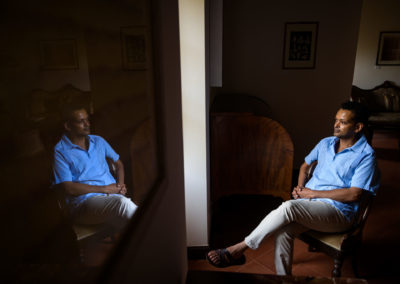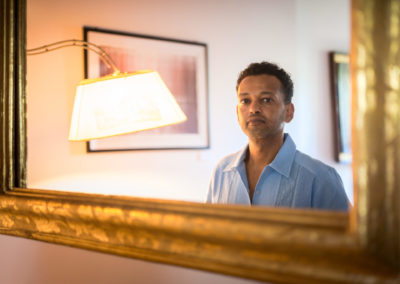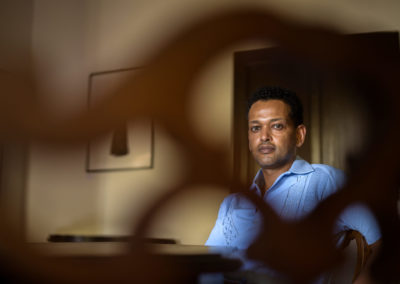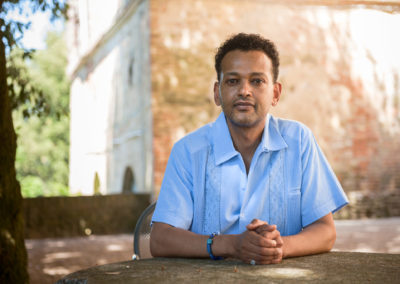This is was an extraordinary experience, one I will treasure forever. This haven in Umbria afforded me the necessary quiet space to start a difficult essay I had been deferring for almost ten years. I began writing the very first day I arrived and have not stopped since. I began (and have nearly finished) a long personal essay, which deals with a time in my life I was receiving death threats for being an openly gay Ethiopian and subsequently (for two years) going on a self-imposed exile from my native country. I suppose I needed enough distance to recall back this difficult chapter of my life; and, I needed the kind of sustenance Civitella affords to deal with those memories and write something meaningful about them. I feel grateful for having had this residency to do just that. Communing with my Fellow Fellows and being inspired daily by their brilliance and nourished by their love; receiving such exceptional care and hospitality by the staff; the glorious vista of the hills from the Russian Terrace and Secret Garden; and much, much more–all of these became rare, daily rituals that made my time at Civitella a very special one. Mille Grazie.
from “The Right to Look”
Grant me a personal detour—a glance back and inward—for the way I learned to look is akin to the way I learned to speak, Amharic being a language at once sensual and emphatic. Before semantics there is sound; before words take on meaning, their sound can signify their emotional content and tap the deep recesses where we safe-keep our innermost feelings. When I was young, I loved the sound of words—like ቋንቋ k’wank’wa, the rise and fall of that word, the (ex)plosive flight you take with the first syllable, ቋ k’wa, how you hover in midair with the quietly audible ን n, then the quick and elegant descent when you reach ቋ k’wa again—like having a staircase in the mouth you could climb up and down with both force and lightness of touch.
It was not literature but the pleasure of the tongue—free to move as it pleased—in hindsight, I can now say with conviction, that would lead me down the path of word-work. And that formative sense of discovery and delight to be had in the sound of words was matched by the freedom I had as a child to cast my gaze wherever I pleased.
The norms of looking vary from place to place. It’s impolite to stare in several cultures, even outright rude. You stare too long you’re liable to invade someone’s privacy or likely to make them feel self-conscious. In some places, staring is not simply a breach of etiquette but of the law: you stare too long you might subject yourself to harm or, worse, murder.
But where I grew up your private gaze was also a shared estate. And that estate was vast, meaning you could take hold of all the vista that lay before you—what this good earth tenders for free, its fauna and flora, all its sentient life—and linger with your regard without violating the edicts of law or culture. I remember once (I may be five or six) staring at a grown man for so long—enamored by what? I don’t exactly know but can recall now that moment and its intensity as if instinct: how his face shone, how my eyes fixed on his, how he granted me whatever boyhood fascination and wonder I was nursing and projecting, and held my gaze with care.
To this day, among the joys of communing with other Ethiopians is to have my regard embraced by the eyes of another, a stranger, without rancor, resentment, or retreat.
Whiteness is a motherfucker—I tried, and tried, to fish for a more sober word but this is the one that keeps catching the line. The white gaze baits you, sinks its curved hook, and forces you out of the element necessary for your thriving. This is how I felt in America when I moved there at 13, and still now 33 years later at 46 how I feel at the tug of the white gaze. Sometimes, even before I see it with my own two eyes, the rest of my body can sense it behind or beside me: there, lurking, leering.
White people are not the sole proprietors of that awful look of judgment, contempt, pity, and hate—of course—a similar gaze is to be found also where other power differentials are systematically encoded and enforced. What woman has not felt the suffocating grip of the male gaze? What queer and trans person hasn’t endured the vigilante eyes of the straight and cis world?
When I was twelve or so (still in Ethiopia) I developed a sudden habit of pulling my sleeves to my elbows and with flare walking around with arms extended all the way out, wrists bent at a ninety- degree angel. Bless his soul, my father, my sole custodian at the time, never said a word about it, nor did my older brother nor my boyhood mates. Until one day, friends of my father’s girlfriend, who’d come over our house, looked at me askance, then checked me: እንዴ ወንድ ልጅ እጁን እንደሱ ያደርጋል እንዴ ende wend lij ejun endesu yadergal ende asked with derision, “Oh really, do boys do that now with their hands?” I still can feel the seizing up of my body and the gesture I had offered freely to the world; can recall a queer boy’s wild abandon crushed, his sissy mannerisms curtailed by a scathing straight tongue and razor-sharp gaze.
How true the Amharic expression, አይኖቹ ቆራጩ ፈላጩ, aynochu k’ora’chu fela’chu, cut and felled by those eyes.
The eye is a marvel, aperture of astonishment. And yet, without lifting a hand, much like the tongue, it’s a body part we deploy to injure the other, each other…



